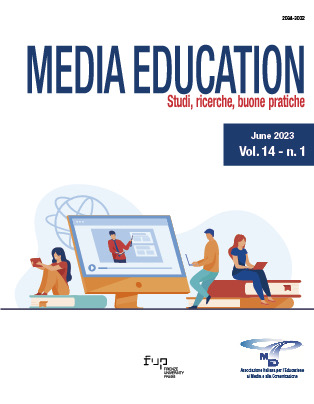Published 2023-01-30
Keywords
- media literacy education,
- critical thinking,
- Cyprus Radio Television Authority,
- Media Literacy Experiential Workshops
Copyright (c) 2023 Antigoni Themistokleous

This work is licensed under a Creative Commons Attribution-NonCommercial-NoDerivatives 4.0 International License.
Abstract
This article considers the Media Literacy Experiential Workshop project provided by Cyprus Radio Television Authority (CRTA). CRTA is the independent regulatory authority of the audiovisual media service providers in Cyprus and media literacy is recognized as one of its statutory duties. Media Literacy Experiential Workshop project is the most popular and notable media literacy initiative undertaken by CRTA. Believing that media literacy skills should be taught, the examined project has been in place since 2014-2015 school-year and aims to provide pupils at primary education with basic and fundamental media literacy skills and competences. During the workshops pupils with the help of the instructor critically examine and deconstruct different advertisements in order to realise how and why some content, values, and points of view are amplified while others are excluded from the media. By the end of the workshop pupils are empowered to critically think of each and every advertisement as a construction and to apply basic analytical parametres to mediated texts in general.
References
- Buckingham, D. (2003). Media education. Literacy, learning and contemporary culture. Polity Press.
- Experts Committee on Media Literacy, (2012), Media Literacy White Paper, https://crta.org.cy/assets/uploads/pdfs/Media%20Literacy%20-%20white%20paper.pdf
- Frau-Meigs, D. & Torrent, J. (2009a). Media Education Policy: Towards a Global Rationale. In D. Frau-Meigs and J. Torrent (eds.) Mapping Media Education Policies in the World: Visions, Programmes and Challenges, 15-21. The United Nations-Alliance of Civilisations in co-operation with Grupo Comunicar. Available at: file:///C:/Users/User/Downloads/181917eng.pdf
- Frau-Meigs, D. and Torrent, J. (2009b). Mapping Media Education Policies in the World: Visions, Programmes and Challenges, p.15-21. The United Nations-Alliance of Civilisations in co-operation with Grupo Comunicar. Available at: file:///C:/Users/User/Downloads/181917eng.pdf
- Jenkins, H. et al. (2009). Confronting the Challenges of Participatory Culture. Media Education for the 21st Century. The MIT Press. DOI: https://doi.org/10.7551/mitpress/8435.001.0001
- Kellner, D., and J. Share. (2005). Toward Critical Media Literacy: Core concepts, debates, organizations, and policy. Discourse: Studies in the Cultural Politics of Education, 26 (3), 369-386. DOI: https://doi.org/10.1080/01596300500200169
- Kennedy, M.F. (1993) Introduction. Canadian Journal of Educational Communication, Special Issue on Media Education, 22(1), 1-3.
- Livingstone, S. (2004). Media literacy and the challenge of new information and communication technologies. The Communication Review, 7 (1), 3-14. DOI: https://doi.org/10.1080/10714420490280152
- Masterman, L. (1993). The Media Education Revolution. Canadian Journal of Educational Communication, 22(1), 5-14. DOI: https://doi.org/10.21432/T2JS5S
- Masterman, L. (2005) Teaching the Media. Routledge.
- Papaioannou, T. and A. Themistokleous. (2018). An overview of media education in Cyprus: concepts and policies. In S. Iordanidou (ed.) Media Literacy: In the search of the concept and the function of media literacy, 35-53. Advanced Media Institute/Metamesonykties Ekdoseis.
- Potter, W.J. (2013). Review of Literature on Media Literacy. Sociology Compass 7/6, 417-435. DOI: https://doi.org/10.1111/soc4.12041
- Pungente, J.J. (1993). The Second Spring: Media Education in Canada’s Secondary Schools. Canadian Journal of Educational Communication, 22(1), 47-60.
- Rey, B., Carette, V., Defrance, A., & Kahn, S. (2012). Les compétences à l’ école. Apprentissage et évaluation. De Boeck.
- Scallon, G. (2004). L’évaluation des apprentissages dans une approche par competences (2nd ecI.). De Boeck Universite.
- Tufte, B. (1993) Media Education in the Dansish Folkeskole. Canadian Journal of Educational Communication, 22(1), 69-77. DOI: https://doi.org/10.21432/T2SC8Z
- Directive 2010/13/EU of the European Parliament and of the Council of 10 March 2010 on the coordination of certain provisions laid down by law, regulation or administrative action in Member States concerning the provision of audiovisual media services (Audiovisual Media Services Directive) (Text with EEA relevance). OJ L 95, 15.4.2010, p. 1–24 https://eur-lex.europa.eu/legal-content/EN/TXT/PDF/?uri=CELEX:32010L0013&from=EN
- Directive 2018/1808/EU of the European Parliament and of the Council of 14 November 2018 amending Directive 2010/13/EU on the coordination of certain provisions laid down by law, regulation or administrative action in Member States concerning the provision of audiovisual media services (Audiovisual Media Services Directive) in view of changing market realities. PE/33/2018/REV/1. OJ L 303, 28.11.2018, p. 69–92 https://eur-lex.europa.eu/legal-content/EN/TXT/PDF/?uri=CELEX:32018L1808&from=EN

